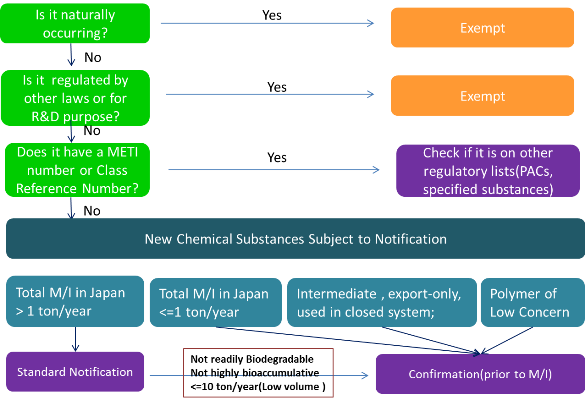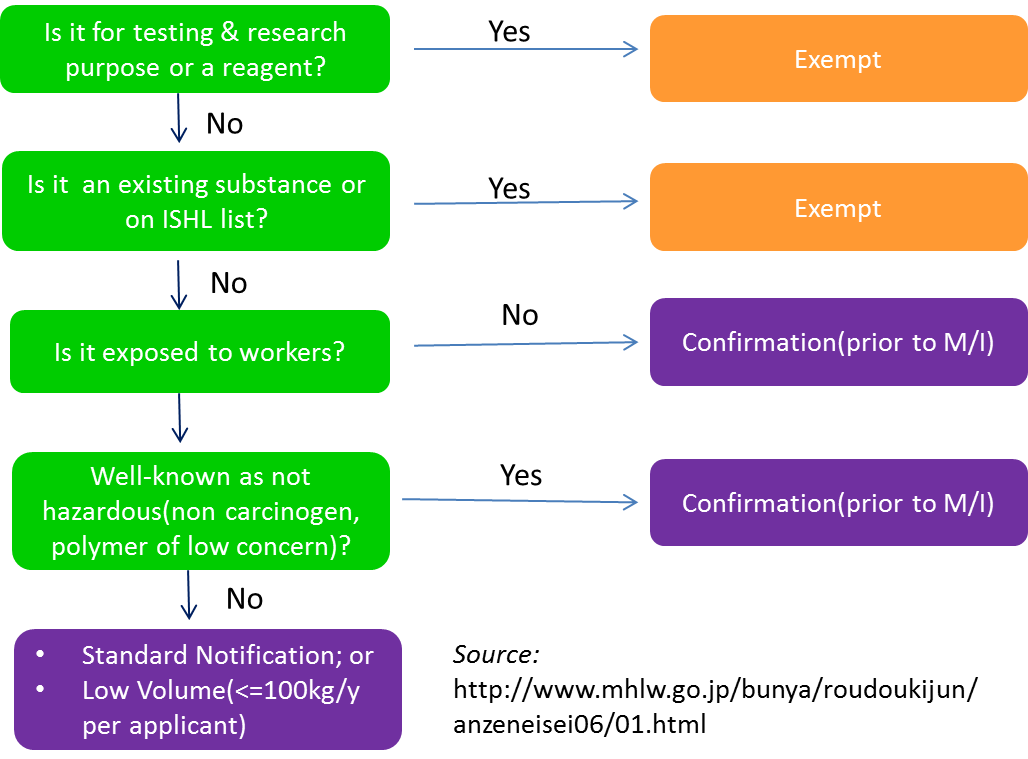New Substance Notification in Japan
Little Pro on 2015-12-31
Both Chemical Substance Control Law (CSCL) and Industrial Safety and Health Law (ISHL) require a new substance to be notified prior to its production and importation. There are many differences between notifying a new substance under CSCL and notifying a new substance under ISHL. The table below summarizes the main differences between CSCL notification and ISHL notification.
| Items | CSCL | ISHL |
|---|---|---|
| Existing Substance Inventory |
|
|
| Applicant |
|
|
| Type of Notification |
|
|
| Standard Notification - Hazard Data |
|
|
| Adding a substance to inventory |
|
|
New Substance Notification under Japan CSCL
A person who intends to manufacture or import a new chemical substance shall notify it to three ministries at least three months prior to the manufacture or importation. The three ministries are the Ministry of Economy, Trade and Industry (METI), the Ministry of Labor and Welfare (MHLW), and the Ministry of the Environment (MOE). They have appointed National Institute of Technology and Evaluation (NITE) as the main body to evaluate new substance notifications under CSCL.
A new substance is defined as a chemical substance other than the following substances:
- A substance that is on the list of existing and new chemical substances (ENCS);
- Monitoring chemical substances;
- Priority assessment chemical substances;
- Class I or II specified chemical substance;
Japan ENCS consists of two parts:
- Existing chemical substances placed on Japanese market before 16 Oct 1973 (approximately 20,600 substances);
- New chemical substances that have been notified under the CSCL, determined to be "safe" and published on government Gazette((approximately 8,000 substances);
Notes: A polymer which is produced from all listed monomers still requires notification under CSCL if the polymer itself is not listed on ENCS. Block-polymers and graft-polymers are not regarded as new substances if their blocks or units are listed on ENCS.
New Substance Notification under CSCL - Exemptions
The following substances are exempt from new substance notification under CSCL:
- Impurities(less than 1%w/w)*;
- Articles;
- Naturally occurring substances;
- Substances for R&D purposes;
- Chemical substances regulated by other laws (i.e, pharmaceuticals, cosmetics, pesticides, food additives, etc.)
* A new substance in the form of impurity or by-product also requires notification if its concentration is above 1%w/w in a product;
The picture below shows how to determine if a substance requires new substance notification under CSCL.

New Substance Notification under CSCL - Types and Data Requirements
| Standard Notification |
|
| Low Volume Notification |
|
| Small Amount Confirmation(**) |
|
| Other Prior Confirmation |
|
New substances notified with standard notification will be added onto ENCS 5 years after its notification. New substances that go through confirmation process will not be added to ENCS.
*Total M/I amount in Japan is the sum of all manufactured and imported volume of the same substance in Japan. It is not the volume manufactured or imported by each legal entity;
**One exception is that small amount confirmation on intermediate allows each legal entity to manufacture or import an intermediate up to 1t/y;
***Criteria for PLC: Large molecular weight (MW>=1,000), content of oligomer (MW<1,000) <1%, and stable in neutral, acid, and alkaline water. Test data required.
New Substance Notification under ISHL
ISHL requires manufacturers and importers to notify a new substance to the Ministry of Labor and Welfare (MHLW) prior to its production and importation. Any substance that is not on ISHL list will be subject to new substance notification under ISHL.
ISHL List also consists of two parts:
- Existing chemical substances under CSCL(in commerce in Japan before 1973)- approximately 20,600 substances;
- New substances notified under ISHL and published on government Gazette;
New Substance Notification - Exemptions and Data Requirements
Not all new substances require notification ISHL. The picture below shows how to determine if a substance requires notification under ISHL and which type of notification is applicable.

There are two types of notification under ISHL: standard notification and small volume notification. For standard notification, the information required is AMES study and other information such as manufacturing process, reaction formula, etc. For low volume notification(<100kg/y), no test data is required.
If one applicant has notified a new substance under CSCL, it can omit some information which it already provided under the CSCL regime if it attaches a copy of its CSCL notification to the ISHL notification.
Reference & Resources
Click here to access all references and resources for Japan including the English translation of regulations, regulatory lists and useful links to the websites of competent authorities.
Having Questions?
We do not provide consultancy services. If you have questions or need any help, please contact our sponsor. You may also find an expert in CSP business directory below. If you are a consultant, you may get yourself listed in CSP business directory (free) or sponsor this page to leave your contact info on this page..

Tags: Topics - Japan, REACH-like Regulation and Registration